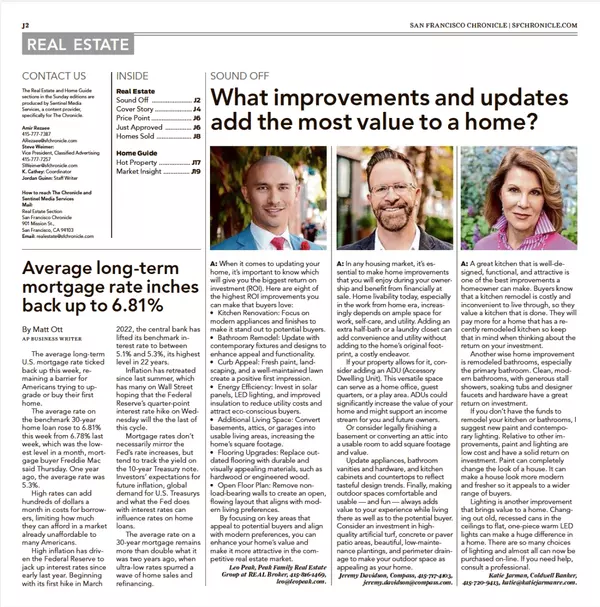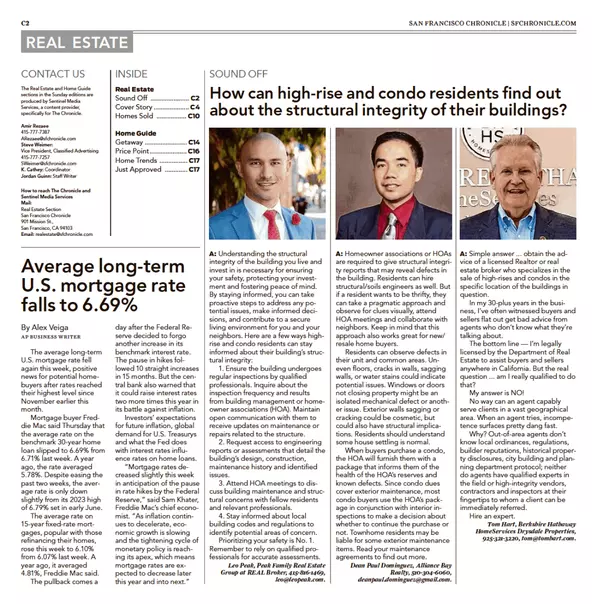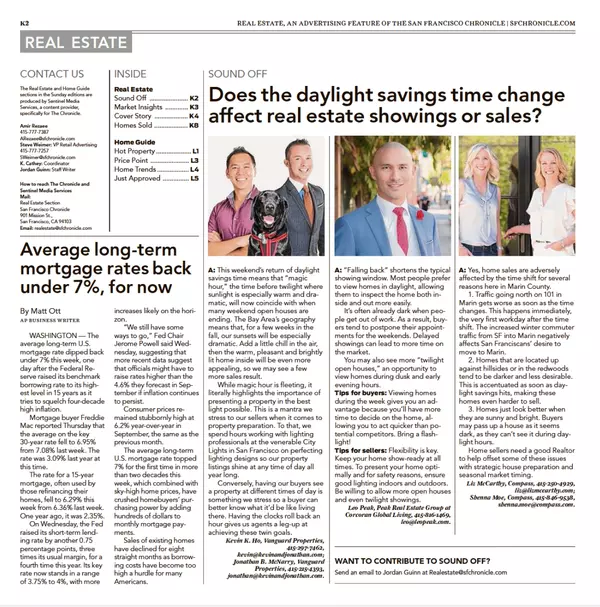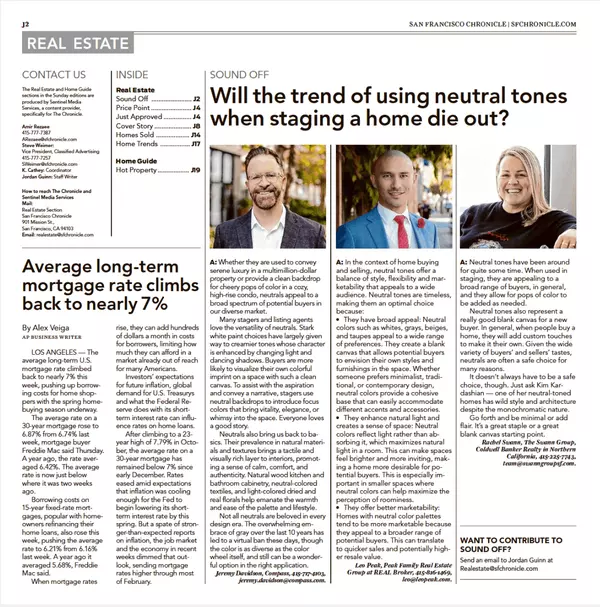Breaking Down the Listing Agreement Into a Deal You Understand

Congrats, homeowner! You’re ready to sell your house, and you’ve picked a real estate agent you trust to get the job done. That’s a big step toward your end goal. But before you can put your home on the market and show it off to the world, you need to make the deal with your real estate agent official.That’s where the listing agreement comes in—to establish a written arrangement between you and your agent, kick off the selling process, and set the stage for the next few months of your home sale. You might feel some nerves about that big, scary contract in front of you. And you likely have a lot of questions about whether the agreement you’re looking at is standard and to your liking. Here’s everything you need to know about the listing agreement so that you can sign on the dotted line with confidence and peace of mind. What is a Listing Agreement? The contract is a legally binding agreement that gives the real estate agent or broker the right to sell the home. There are several different types of listing agreements, but three of them are most commonly used. The Most Common Types of Listing Agreements Exclusive Right to Sell Listing: The Exclusive Right to Sell listing is the most commonly used listing agreement among homeowners and real estate agents. It’s a legally binding contract that allows the real estate agent (or brokerage) full and total control over the transaction and rights to the agreed upon commission once the home sells. “99% of the time the listing agreement is a listing agreement where the listing agents are responsible for everything,” said Lenchek. In an Exclusive Right to Sell Listing Agreement, the real estate agent is given the rights to market the home, list the home on MLS, and receive the commission if the real estate agent closes a sale within the determined time frame. Any mistakes in the terms of the Exclusive Right to Sell Listing Agreement can affect the outcome of the sale and how much the seller will owe to the real estate agent, so it is important for the seller to understand what they are signing. Exclusive Agency Listing: In an exclusive agency listing, the homeowner allows one real estate agent or broker to try to sell the home. However, similar to an open listing, you have the right to find a buyer on your own. If you find a buyer on your own, the real estate agent would not receive any sort of commission. While this agreement allows you to fall back on the help of real estate agent if you can’t sell your home yourself, real estate agents are a little reluctant to spend their time trying to sell a property without a guaranteed commission when it sells. What Goes Into a Listing Agreement? The listing agreement, particularly the Exclusive Listing Agreement, involves everything––from what’s included in your home sale (appliances, chandeliers, etc.) to real estate agent compensation. The contract lays out the terms of how the real estate agent can promote your home. This includes the use of the MLS, internet marketing, lockbox, and for-sale signs. There are also clauses that adhere to Equal Opportunity Housing, attorney fees, and dispute resolution and mediation. You will also grant the agent the rights to use the listing content which includes photos, graphics, videos, drawings, virtual tours, written descriptions, and any other copyrightable elements relating to the property, according to the National Association of Realtors. The terms involved in the agreement serve as the foundation of your entire real estate transaction, so it’s extremely important that you read each line carefully. Do You Have to Sign a Listing Agreement? If you want to sell your home using a real estate agent, you absolutely have to sign a listing agreement, according to Lenchek. If you choose to list your home as for-sale-by-owner (FSBO), you do not have to work with a real estate agent, and therefore do not have to sign a listing agreement. When Do You Sign the Listing Agreement? According to Lenchek, it all depends on the situation. While some homeowners sign the listing agreement on the first meeting, others may wait weeks or months until they are ready to sell their home. Whatever the case, a listing agreement will be signed once you are ready for your real estate agent to start marketing your home. How Long Does a Listing Agreement Last? A listing agreement is valid from the date you sign it until the expiration date. The expiration date depends on a few factors and varies by situation. The condition of the home, the current real estate market, and homeowner’s needs are all factors that play a role in how long a listing agreement remains valid. Typically, a listing agreement will last from two to six months from the time it’s put on the market. Lenchek mentioned that if a house needs a lot of maintenance, or if the homeowners were in a different state, the owner may sign the listing agreement ahead of time even though it may be two months until you put your house on the market. The expiration date also depends on the real estate market and the comparable homes in the area. If every comparable home in the area has sold in less than 60 days, you may want to sign up for a two-month contract. Ultimately, the expiration date of the agreement can be negotiated with your real estate agent. What Can You Negotiate in the Listing Agreement? As Lenchek puts it, in real estate, everything is negotiable. If you’re uncomfortable with certain terms, say something to your real estate agent or real estate broker that they work for. If they refuse to negotiate, you may want to consider finding a different agent or a different brokerage. Be careful though. Some negotiations may send a real estate agent walking. Here are some common things to negotiate in the listing agreement: Expiration date: Real estate agents want to be confident that they will sell your house, so they may want a longer expiration date to give themselves plenty of time. If you believe your home is particularly special and can sell faster than the time frame suggested by the real estate agent, you have a right to negotiate. Most real estate agents will listen to a homeowner’s concerns and find a way to compromise. Commission: Most listing (or seller’s) agent commissions are between 5% and 6% and are typically split with the buyer’s agent when the deal closes. The commission percentage is decided on when signing the listing agreement, and then becomes part of the MLS listing, so it can’t be changed once the agreement is signed. Legally, you can negotiate compensation percentage, but it could affect the sale––and your real estate agent isn’t required to accept your terms. A big chunk of real estate agent fees goes to marketing your house, so lowering the commission could lower the quality of marketing for your home. Keep in mind, if you negotiate your real estate agent’s commission to a lower percentage, you also reduce the compensation a buyer’s agent would receive at the deal’s close. Unfortunately, some buyer’s agents may secretly steer clear of showing homes that offer a low commission, though the practice is technically unethical and frowned upon. The decision is ultimately yours, but be aware that a lower commission could slow down your buyer foot traffic for reasons outside your control. Type of Listing: You have the right to choose the type of listing agreement they want to use. While most real estate agents choose to sign an Exclusive Right to Sell agreement, you can negotiate a different agreement. However, this may make it harder to find a real estate agent to work with, which could hold up your sale. List Price: The listing agreement will specify what you will list your home for. Your real estate agent will determine a recommended list price based on market data, comparable homes that have sold in the area, and condition of the home. As the homeowner, you have a right to negotiate the list price. In most cases, it is best to go with a top real estate agent’s recommendation. Duties: The duties of a seller’s real estate agent includes things like listing the address of the home online, posting a sign in the yard, and creating a list sheet. If you have any issue with these things or the other duties listed in the agreement, you can negotiate them with your real estate agent or the broker that your agent works for. What Should You Look Out For in a Listing Agreement? Since a listing agreement is a legally binding contract for a major financial investment, it’s important to look out for red flags before you sign. To save yourself from a bad real estate experience, work with a top-performing, experienced real estate agent. Here are 7 red flags to look out for when you sit down to sign a listing agreement with your real estate agent. Check the agent’s real estate license. It’s probably a formality (especially if you found your real estate agent through HomeLight) but you should always make sure your agent is legally allowed to sell real estate in your state. Ask if they work as an agent full time. While part-time real estate agents often do a fine job, they may not be able to devote quite enough time to your sale. HomeLight’s data shows that part-time real estate agents rarely break into the top 3% of performing agents in their area nationwide. Read reviews. An experienced real estate agent will have client reviews to support their reputation. If you can’t find any reviews online, ask your real estate agent to provide a list of client referrals. Don’t pay them anything up front. You should never have to pay a real estate agent before your home is sold. If an agent or a brokerage requests a payment before signing the listing agreement, don’t sign it and find a new agent. Negotiate the terms. If you aren’t comfortable with the terms of the listing agreement, ask the real estate agent to change them. A top real estate agent or broker will be willing to compromise for the needs of the client. Check the expiration date. Be aware of the expiration date of the listing agreement. If the agreement lasts longer than what you had in mind, don’t sign it until you bring it up to your real estate agent. Know the commission. Make sure the commission written in the agreement is the amount you and your agent agreed on. If you make changes to the contract, don’t sign it until the changes are fixed. How Do You Terminate a Listing Agreement? Technically, a listing agreement is a contract so there’s no provision for it to be terminated. Before signing the listing agreement, you can ask your real estate agent if they’ll allow written terms for ending the contract early. Some real estate agents and brokers will allow that, and some won’t. If you’re unhappy with the services of your real estate agent during your home sale, you can ask them to let you out of the contract. Lenchek said he’ll always write in a client’s terms for cancellation if necessary. He also added that if you signed with a brokerage and you are unhappy with a particular agent, you can ask to switch agents in the same brokerage without breaching the contract. “Real estate is a service industry. If you’re not prepared to give top-notch service to your clients, you really shouldn’t be in the business,” Lenchek said. He adds that in the rare case that a homeowner is unhappy with his services, he’ll let them out of the agreement without any trouble. What Is the Protection Period in a Listing Agreement? The protection period in a listing agreement is specifically there to protect the real estate agent. For a certain amount of days after the contract expires, if any of the potential buyers that the seller’s agent brought in actually buy the home, then you will still owe them the commission. What Is the Mediation and Dispute Clause in a Listing Agreement? The mediation and dispute clause in the listing agreement simply states that if there is a disagreement between you and your real estate agent in the duration of the contract, you will meet with an impartial third-party to try to work out any issues. It is meant to avoid unnecessary legal issues between you and your agent in the midst of the home sale. Does a Listing Agreement Cost Me Anything Upfront? A listing agreement shouldn’t cost anything up front. Rather, it determines the compensation for the real estate agent after closing. “The listing agreements do have a clause that says if something happens and you part company, the sellers are responsible for the listing agent’s expenses,” Lenchek adds. “But I never have and never will incur that clause.” What Happens to the Listing Agreement if My Home Doesn’t Sell? Once a listing agreement expires, the contract is terminated and the house is taken off the market. You will be free to either look for another real estate agent or broker, extend the listing agreement with your current real estate agent or broker, or take their home off the market completely. That’s The Nitty-Gritty on Real Estate Listing Agreements Understand what you’re signing and communicate with your real estate agent. The listing agreement will control your entire home sale, from the list price of your home to the amount you owe your agent when it closes. Negotiate the terms that you are uncomfortable with and find a top real estate agent to get you through a home sale stress-free. And as always—read the fine print! ---- original post published by by Corinne Rivera in Homelight.com
Read MoreUnderstanding the CA Real Estate Purchase Agreement

Buying a house can be a big deal, and not just because of the complexities of the home buying process. There’s also a big legal component to consider when entering a real estate transaction, particularly when signing a purchase agreement. This article will explain what a purchase agreement means in a real estate transaction, and help you to understand how it’s prepared and what components make it up. What Is A Real Estate Purchase Agreement? In real estate, a purchase agreement is a binding contract between a buyer and seller that outlines the details of a home sale transaction. The buyer will propose the conditions of the contract, including their offer price, which the seller will then either agree to, reject or negotiate. Negotiations may go back and forth between the buyer and the seller before both parties are satisfied. Once both parties approve the terms and have signed the purchase agreement, they're considered to be "under contract" or "ratified." Who Prepares The Real Estate Purchase Agreement? Typically, the buyer's agent writes up the purchase agreement. However, unless they are legally licensed to practice law, real estate agents generally can't create their own legal contracts. Instead, firms will often use standardized form contracts that allow agents to fill in the blanks with the specifics of the sale. What’s Included In A House Purchase Agreement? Every real estate transaction is different, so not all real estate purchase agreements will look the same. However, there are some basic items that should be included in every purchase agreement. Buyer and seller information Property details Pricing and financing Fixtures and appliances included/excluded in the sale Closing and possession dates Earnest money deposit amount Closing costs and who is responsible for paying Conditions under which the contract can be terminated Contingencies or conditions that must be met for the sale to go through Understanding The Components Of A Real Estate Purchase Contract While many parts of your contract are fairly straightforward, like what price you'll pay and when closing will happen, other parts of the purchase agreement might be a little confusing, especially for first-time home buyers. Make sure you fully understand the entire purchase agreement before you sign it. Financing Your real estate contract will include information about how the home will be paid for. If the buyer isn't paying in cash, they'll need some sort of financing (like a mortgage loan) to buy the home, the specifics of which will be written out in the contract. For example, the contract will specify if the buyer is obtaining a mortgage to purchase the property, or if they're using an alternative, such as assuming the current mortgage on the property. Another option is seller financing, where the buyer makes payments to the seller rather than a traditional mortgage lender. Earnest Money Deposit Earnest money, sometimes also referred to as a good faith deposit, shows that a buyer is serious about buying the home. Sellers don't want to waste their time; they want to know that a buyer is going to stick with the contract through closing. The earnest money deposit gives them that confidence. If, between the time you sign the purchase agreement and close on the home, the buyer decides they want to back out for a reason that isn't stipulated in the contract, they lose their earnest money, and the seller gets to pocket it. However, a buyer can get their earnest money back if they back out due to a reason stipulated in the contract. Earnest money is typically held in escrow by a third party and is credited toward the down payment or closing costs at closing. Contingencies There are many different types of contingencies that can be included in real estate contracts on both the buyer's and seller's side, and it's important to understand any contingencies that are included in your purchase agreement. Contingencies are conditions that must be met before the sale can go through. Here are some of the more common contingencies you may see in home sale contracts: Financing contingency: The sale is contingent on the buyer being able to obtain financing. This protects the buyer in the case they are unable to secure a mortgage. Inspection contingency: The buyer is able to back out of the sale without penalty if they aren't satisfied with a professional inspector's assessment of the home. Appraisal contingency: This contingency states that the home must appraise at a value equal to or higher than what the buyer agreed to pay. Home sale contingency: The home purchase is contingent on the buyer's ability to sell their current home. Closing Costs At closing, there are certain fees and costs that will need to be paid. How much each party will pay will depend on what was negotiated in the contract. Closing costs can include things like the real estate agent's commission, appraisal and inspection fees, taxes, lenders fees and insurance. For buyers, closing costs may be 3 – 6% of the purchase price. Closing costs may be slightly higher for sellers. Can A Real Estate Purchase Agreement Be Cancelled? The best time to back out of a real estate purchase is before you’ve signed the purchase agreement. After that, you’re under contract, and you may be penalized if you back out for reasons that aren’t stipulated in the purchase agreement. Before signing a purchase agreement, make sure it includes information about the conditions under which the contract can be terminated. FAQS About Real Estate Purchase Agreements How do you write a real estate purchase agreement? The purchase contract is typically prepared and written out by a real estate agent, not a buyer or a seller. As discussed above, a purchase agreement should contain buyer and seller information, a legal description of the property, closing dates, earnest money deposit amounts, contingencies and other important information for the sale. How legally binding is a purchase agreement? A purchase contract is as legally binding as is stated in the agreement itself. A purchase agreement should stipulate acceptable reasons for a buyer backing out of a purchase. Otherwise, once it’s signed, you stand to lose your earnest money deposit should you break your contract. A seller can back out of a contract for several reasons, such as complications that arise from contingencies in the purchase agreement. Do purchase agreements expire? Yes, and any expiration date should be clearly outlined in the purchase agreement. The Bottom Line Even if you aren't a legal expert, it's still important to understand the legal and contractual aspects of your home sale or purchase. Buying or selling a home is a big deal, and you can avoid headaches by making sure the deal you're getting into is a good one. Originally published on Quickenloans.com
Read MoreFAQ: What improvements and updates add the most value to a home?

A: When it comes to updating your home, it’s important to know which will give you the biggest return on investment (ROI). Here are eight of the highest ROI improvements you can make that buyers love: • Kitchen Renovation: Focus on modern appliances and finishes to make it stand out to potential buyers. • Bathroom Remodel: Update with contemporary fixtures and designs to enhance appeal and functionality. • Curb Appeal: Fresh paint, landscaping, and a well-maintained lawn create a positive first impression. • Energy Efficiency: Invest in solar panels, LED lighting, and improved insulation to reduce utility costs and attract eco-conscious buyers. • Additional Living Space: Convert basements, attics, or garages into usable living areas, increasing the home’s square footage. • Flooring Upgrades: Replace outdated flooring with durable and visually appealing materials, such as hardwood or engineered wood. • Open Floor Plan: Remove non-load-bearing walls to create an open, flowing layout that aligns with modern living preferences. By focusing on key areas that appeal to potential buyers and align with modern preferences, you can enhance your home’s value and make it more attractive in the competitive real estate market. --- Original article published in the San Francisco Chronicle on July 30, 2023.
Read MoreHow can high-rise and condo residents find out about the structural integrity of their buildings?

A: Understanding the structural integrity of the building you live and invest in is necessary for ensuring your safety, protecting your investment and fostering peace of mind. By staying informed, you can take proactive steps to address any potential issues, make informed decisions, and contribute to a secure living environment for you and your neighbors. Here are a few ways high-rise and condo residents can stay informed about their building’s structural integrity: 1. Ensure the building undergoes regular inspections by qualified professionals. Inquire about the inspection frequency and results from building management or homeowner associations (HOA). Maintain open communication with them to receive updates on maintenance or repairs related to the structure. 2. Request access to engineering reports or assessments that detail the building’s design, construction, maintenance history and identified issues. 3. Attend HOA meetings to discuss building maintenance and structural concerns with fellow residents and relevant professionals. 4. Stay informed about local building codes and regulations to identify potential areas of concern. Prioritizing your safety is No. 1. Remember to rely on qualified professionals for accurate assessments. --- Original article published in the San Francisco Chronicle on June 18, 2023.
Read MoreFAQ: What are the pros and cons of a proposed 55-story highrise in the Outer Sunset?

A: A proposed 55-story, mixed-use residential highrise in the Outer Sunset has generated mixed reactions. It will include 712 residential units, retail, commercial, plus common and private open spaces. Here are some pros and cons of the project: Pros: • Provides much-needed housing to San Francisco. • Creates job opportunities. • May attract more business to the area. • Promotes sustainability through the use of green roofs and solar panels. On the other hand, some concerns have been raised, including: • Being out of character with the surrounding low-rise buildings. • Significant increase in traffic. • Impair local resources, like transportation and parking. • Overcrowding in local schools. While the potential benefits of new housing and sustainable design are promising, the impact of such a large development on the neighborhood’s character and infrastructure raises valid concerns. As someone who grew up in the Outer Sunset, it will be fascinating to see how the community responds, and the inevitable showdown that will ensue. --- Original article published in the San Francisco Chronicle on April 23, 2023.
Read MoreFAQ: What are your thoughts on the proposal to revitalize several piers along the Embarcadero?

A: The current proposal to rebuild Pier 30 and 32 along the Embarcadero is slated to include an outdoor swimming pool, kayak launch, office space, retail, recreational facilities and maritime uses. Additionally, the adjacent former parking lot at 330 Seawall would be the site for 714 new residential units. Revitalizing the piers along the Embarcadero is an excellent opportunity to boost the local economy, create new job opportunities, attract more businesses to the area, and add more housing that the City desperately needs. By creating new and exciting public spaces, the City will attract more visitors, new potential residents, and will improve the lackluster landscape between two long-standing attractions, the Ferry Building and Oracle Park. Overall, this proposal has the potential to create numerous benefits for San Francisco, making it an even more vibrant and desirable place to visit and live. --- Original article posted in the San Francisco Chronicle on April 9, 2023.
Read MoreFAQ: Do you expect a crash in the Airbnb market?

A: Data from AirDNA, a short-term rental (STR) analytics firm, has indicated demand growth of 19.8% year-over-year. Despite this increase in bookings, the number of STR listings on the market has increased sharply, leading to lower occupancy rates. Many properties are now facing vacancy and financial losses due to the lack of rental income. Will we see a sudden influx of STR homes back on the market? We’ll more likely see a pivot into long-term rentals. Here’s why: • Locked in rates: Many of these homes were purchased with historically low interest rates. The rent could cover all the homeowner’s expenses. • Housing supply is still low: The current demand for housing still outpaces home building, which means a large pool of potential renters. • Inflation: Homebuyers have been priced out, increasing rental demand and forcing higher rents. Also, investment properties have historically proven to be an excellent hedge against inflation. Original article published in the San Francisco Chronicle on January 29, 2023.
Read MoreFAQ: What are the benefits to virtual staging over traditional staging?

A: Virtual staging has become increasingly popular in recent years and offers several benefits over traditional staging, including: • Customization: Virtual staging can offer a wider variety of furnishings and styles, while traditional staging is limited to a stager’s own inventory and aesthetic. Virtual staging can display a room multiple ways, broadening its appeal and potential buyer pool. Imagine an unused bedroom repurposed into an office or kids’ play area. Visualize an outdated kitchen after a remodel, or an ADU in the garage. Possibilities are endless with just a click of a mouse. • Affordability: Traditional staging can typically run into the thousands, depending on the home’s size, number of rooms, etc. Virtual staging ranges from $25 to 75 per photo. Staging helps buyers visualize the potential of a space, forging a connection between the buyer and a home. While a virtually staged home will present better than an empty home, nothing beats the in-person look and feel of traditional staging. Original article published in the San Francisco Chronicle on December 18, 2022.
Read MoreFAQ: Does the daylight savings time change affect real estate showings or sales?

A: “Falling back” shortens the typical showing window. Most people prefer to view homes in daylight, allowing them to inspect the home both inside and out more easily. It’s often already dark when people get out of work. As a result, buyers tend to postpone their appointments for the weekends. Delayed showings can lead to more time on the market. You may also see more “twilight open houses,” an opportunity to view homes during dusk and early evening hours. TIPS FOR BUYERS: Viewing homes during the week gives you an advantage because you’ll have more time to decide on the home, allowing you to act quicker than potential competitors. Bring a flashlight! TIPS FOR SELLERS: Flexibility is key. Keep your home show-ready at all times. To present your home optimally and for safety reasons, ensure good lighting indoors and outdoors. Be willing to allow more open houses and even twilight showings. Original article was published in the San Francisco Chronicle on November 6, 2022.
Read MoreFAQ: How do you help people with disabilities and mobility issues find housing?

A: When helping people with disabilities and mobility issues find a home to purchase in the Bay Area, it is top priority to fully understand the buyer’s specific needs and what features of a home would allow them to have an enjoyable daily experience. Once we determine these specifics, I preview homes in person to see if they can accommodate my buyer’s needs, or have the potential to do so with reasonable modifications. I explore the neighborhood to determine accessibility to necessary and recreational activities as well. Then, my buyers and I can preview the qualified homes together through FaceTime, 3-D and video tours. Doing this up front can alleviate the stress and challenges of touring many homes in-person. If we find a home that needs modifications, we can help coordinate any work with our team of contractors. When living with a disability, finding the right home takes more effort, but buying one that accommodates you is liberating and rewarding. Original article was published in the San Francisco Chronicle on October 2, 2022.
Read MoreFAQ: When is it a Good Idea to Waive Contingencies and When is it Not?

A: The shifting market is making it possible for buyers to once again include contingencies in their offers. Consider the following when deciding to keep or waive any of these three most common contingencies: Inspection contingency: » Don’t waive if there are no reports on the home. » Don’t waive if you have reservations about the home or neighborhood. » Consider waiving if there are inspections, reports, disclosures available that you’re confident in and you’re familiar with the area. Appraisal Contingency: » Don’t waive if you do not have enough reserves to cover the difference if the appraisal comes up short. » Consider waiving if no loan is needed to purchase the property. Loan Contingency: » Not needed when no loan is needed to purchase. » Consider waiving after you’ve talked with your loan officer. In a multiple offer situation, removing contingencies can keep your offer competitive, but if you have any reservations, keep those contingencies — your safety net — in place. The original article was posted in the San Francisco Chronicle on September 18, 2022.
Read MoreFAQ: Do You Recommend Homebuyers Invest in a Home Warranty?

A: Deciding to invest in a home warranty will depend on several factors, including the home’s age, how much work you’re willing to do yourself, and whether you have reserves for unexpected repairs. A home warranty may be a good idea if inspections show your appliances or home systems may be near the end of their lifespan, if you’re not a DIY-er, or don’t have a handyman on speed-dial. Also, if you don’t have a reserve fund set up, a home warranty could help. You may not need a home warranty if you’re already experienced with home improvements, or if you’re buying new construction (most builders provide a warranty covering workmanship and materials). Home warranties vary wildly in their coverage, terms and limitations, so if you do consider purchasing a warranty to protect your home investment and for peace of mind, always read the fine print. » Insider tip: If you’re a seller, offering a home warranty can give you an edge over the competition in today’s market. Original article published in the San Francisco Chronicle on August 21, 2022.
Read MoreFAQ: How has the recent jump in inflation affected home prices?

A: Inflation is an increase in the cost of goods over time, and therefore a decrease in purchasing power. Historically, as inflation rises, so does home prices. The past two years, home prices have soared, but in recent months, we’ve been starting to see home prices soften a bit. As people have to now spend much more for gas, food, clothes, etc, their budgets to purchase a home are smaller. The combination of inflation, plus higher mortgage interest rates have made it much less affordable for homebuyers. And with less buyers, sellers are finding themselves lowering their asking prices. What does this mean for buyers and sellers? » Sellers: Selling your home now can still net you a lucrative return on your investment, considering the unprecedented appreciation of home prices in the past two years. » Buyers: If your circumstances and budget allow, this could be a golden opportunity with less competition and a little more supply. -- Originally published in the San Francisco Chronicle on July 24, 2022.
Read More
Recent Posts











